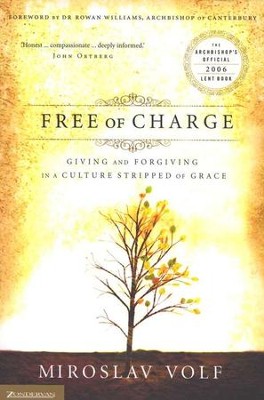Add To Cart
or checkout with

or checkout with
In our increasingly graceless culture, where can we find the motivation to give? And how do we learn to forgive when forgiving seems counterintuitive or even futile? A deeply personal yet profoundly thoughtful book, Free of Charge explores these questions--and the further questions to which they give rise--in light of God's generosity and Christ's sacrifice for us.
Miroslav Volf draws from popular culture as well as from a wealth of literary and theological sources, weaving his rich reflections around the sturdy frame of Paul's vision of God's grace and Martin Luther's interpretation of that vision. Blending the best of theology and spirituality, he encourages us to echo in our own lives God's generous giving and forgiving.
A fresh examination of two practices at the heart of the Christian faith--giving and forgiving--the Archbishop of Canterbury's Lenten study book for 2006 is at the same time an introduction to Christianity. Even more, it is a compelling invitation to Christian faith as a way of life.
| Title: Free of Charge: Giving and Forgiving in a Culture Stripped of Grace By: Miroslav Volf Format: Paperback Number of Pages: 224 Vendor: Zondervan Publication Date: 2005 | Dimensions: 8.5 X 5.5 (inches) Weight: 8 ounces ISBN: 0310265746 ISBN-13: 9780310265740 UPC: 025986265748 Stock No: WW65746 |
We are at our human best when we give and forgive. But we live in a world in which it makes little sense to do either one. In our increasingly graceless culture, where can we find the motivation to give? And how do we learn to forgive when forgiving seems counterintuitive or even futile?
A deeply personal yet profoundly thoughtful book, Free of Charge explores these questions--and the further questions to which they give rise--in light of God's generosity and Christ's sacrifice for us. Miroslav Volf draws from popular culture as well as from a wealth of literary and theological sources, weaving his rich reflections around the sturdy frame of Paul's vision of God's grace and Martin Luther's interpretation of that vision.
Blending the best of theology and spirituality, he encourages us to echo in our own lives God's generous giving and forgiving. A fresh examination of two practices at the heart of the Christian faith--giving and forgiving--the Archbishop of Canterbury's Lenten study book for 2006 is at the same time an introduction to Christianity. Even more, it is a compelling invitation to Christian faith as a way of life.
"Miroslav Volf, one of the most celebrated theologians of our day, offers us a unique interweaving of intense reflection, vivid and painfully personal stories and sheer celebration of the giving God . . . I cannot remember having read a better account of what it means to say that Jesus suffered for us in our place." -- Dr. Rowan Williams, Archbishop of Canterbury
Miroslav Volf is the Henry B. Wright Professor of Theology at Yale Divinity School and founder and director of the Yale Center for Faith and Culture. He was educated in his native Croatia, in the United States, and in Germany, and received his Ph.D. and postdoctoral degrees (with highest honors) from the University of Tübingen (Germany). He has written or edited more than 20 books and more than 100 scholarly articles. Among his most significant books are the present Exclusion and Embrace, winner of the Grawemeyer Prize for Religion and one of the 100 most important religious books of the 20th century according to Christianity Today; Flourishing: Why We Need Religion in a Globalized World (2016), and (with Matthew Croasmun) For the Life of the World: Theology that Makes a Difference (2019).
What would you like to know about this product? Please enter your name, your email and your question regarding the product in the fields below, and we'll answer you in the next 24-48 hours.
If you need immediate assistance regarding this product or any other, please call 1-800-CHRISTIAN to speak directly with a customer service representative.